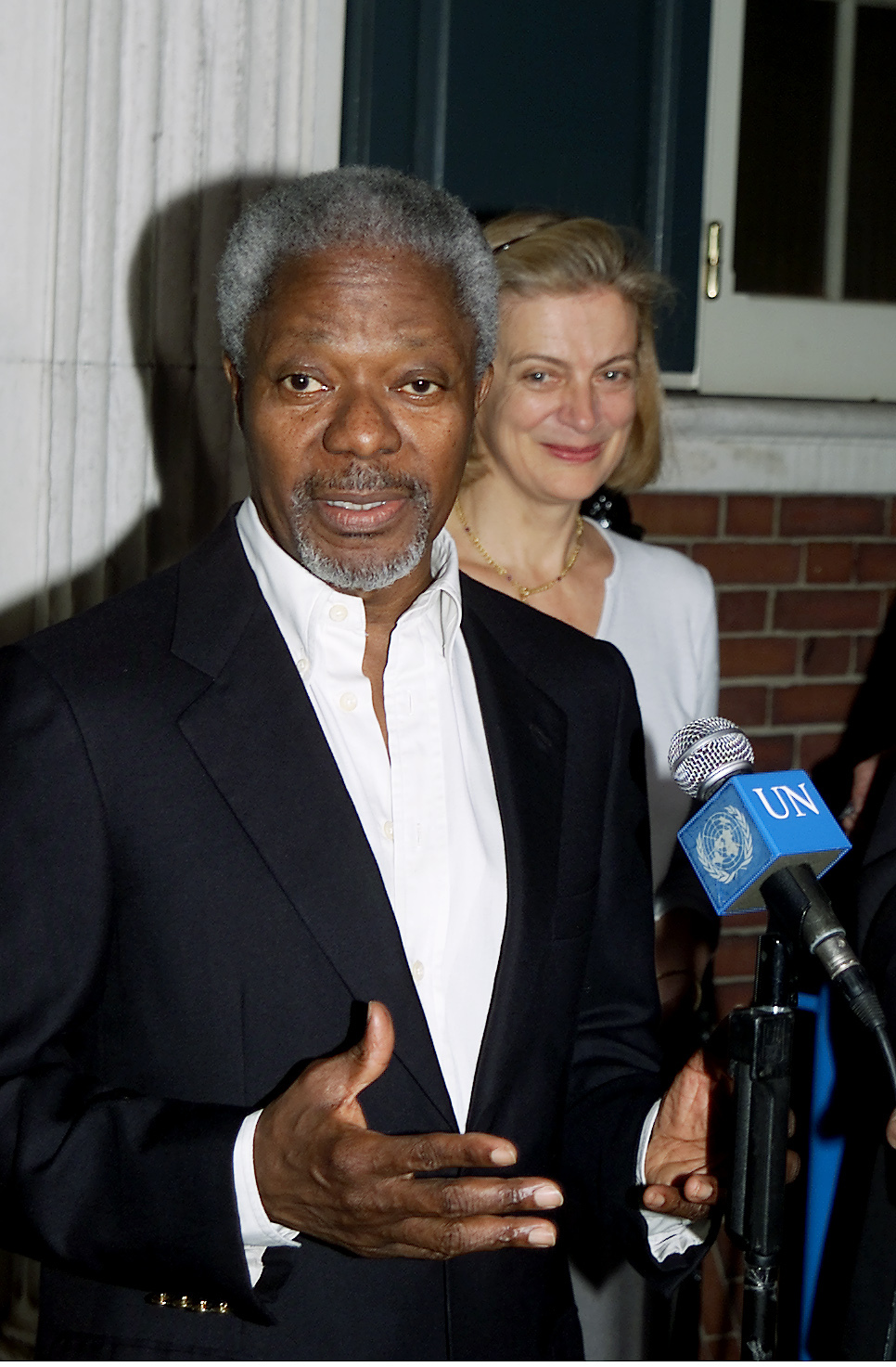Bully Pulpit
As UN expert Brian Urquhart has said, the Secretary-General has no resources of his own to carry out policy, therefore, the public profile and figure of the office is the only base from which a Secretary-General can build norms and challenge the international community. According to Annan, who has been perhaps the only Secretary-General to use his office as a bully pulpit, "quite frankly, there's very little the Secretary-General can do himself or can do alone. . . . You have to come up with inspirational things, and then empower people and then encourage people to go out and do it. . . . So, if you don't use that bully pulpit and your voice, you restrain yourself severely, in my judgment." He acknowledges that had he served during the Cold War, it would have been quite different. "The end of the Cold War gave me some freedom in the sense that the world was changing. . . . So, on the issues of promotion of democracy, individual rights, human rights, since everyone claimed either they were democratic or imagined democracy, or aspiring to be democratic, they couldn't really take you on forcefully in public."40
Annan took great advantage of his office as a bully pulpit, promoting human rights, pressing the norm the Responsibility to Protect, and developing a conscience within major corporations around the world by creating the Global Compact whereby companies would sign on to a code of conduct on human and worker's rights. He took on the fight against HIV/AIDS as a personal priority by forming the Global Fund for HIV/AIDS, malaria, and tuberculosis, and pressing countries to contribute funding. People who worked with him have said that he would create a "peg" of an idea he wanted to promote and then he would work over time hanging things on that peg. He also continued the practice of every Secretary-General of trying to find peaceful solutions to conflicts around the world by using his "good offices" as a means of mediation. Annan felt strongly that the United Nations must stand for the common good and be an Organization for the peoples. As author Kent Kille has suggested, a Secretary-General can be 18 observed for how much emphasis he places on the promotion of the values of the UN and the UN Charter. Annan believed very deeply in the goals of the UN and upholding the rule of law as embodied in the Charter. When the war broke out in Iraq without Security Council approval in the spring of 2003, he found himself in an untenable position. On the one hand, he believed in the peaceful resolution of conflict and the authority of the Security Council. The Charter states any use of force must be authorized by the UN Security Council, except in the case of selfdefense after having been attacked. Yet, he also had to remain impartial in the face of all the Member States, particularly the permanent members, including especially the US. It was an impossible balancing act. Some of the Members implored him to declare openly that the War in Iraq was illegal, but he resisted that pressure. What he continued to say when pressed by the media was that the war was "not in conformity with the UN Charter."
However, in a fateful interview with the BBC, and most likely out of fatigue, after stating his mantra about not being in conformity with the UN Charter, the interviewer continued to push saying doesn't that mean it is illegal? While Kofi finally agreed with the interviewer's perspective, Annan never said the word "illegal." Nevertheless, that is how it came out in the press and Annan paid dearly for this. Members of the conservative right in the United States, who never support the United Nations at any rate, began an aggressive attack on Annan. The disclosures of discrepancies in the oil-for-food program that were coming out became the ammunition that they were looking for and the onslaught was severe and persistent. Calls for Annan to resign bore down on him and he almost did resign. Only after a lengthy report by the Volcker Commission, that took over a year to complete, found Annan innocent of the allegations and only criticized him for not overseeing the program more aggressively, did Annan emerge from a deep depression. Once this personal crisis was over, he began to recover. In his final years as Secretary-General, he took up once again the fight against poverty and the Millennium Development Goals. At the 60th Anniversary of the UN, in 2005, Annan pushed for the heads of state attending the summit to sign onto a list of eight goals and criteria for their achievement by 2015. The Outcome Document which also contained language on the support for the Responsibility to Protect was accepted unanimously by a vote of consensus in the final day of the summit. With this achievement, Annan had recovered.
Notes:
40. Ibid
